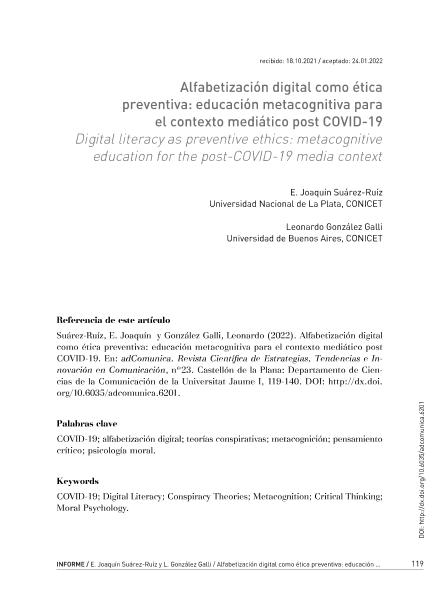Mostrar el registro sencillo del ítem
dc.contributor.author
Suárez, Ernesto Joaquín

dc.contributor.author
Gonzalez Galli, Leonardo Martin

dc.date.available
2022-07-21T12:26:00Z
dc.date.issued
2022-02
dc.identifier.citation
Suárez, Ernesto Joaquín; Gonzalez Galli, Leonardo Martin; Alfabetización digital como ética preventiva: Educación metacognitiva para el contexto mediático post COVID-19; Asociación para el Desarrollo de la Comunicación; Universitat Jaume I. Facultat de Ciències Humanes i Socials; adComunica; 23; 2-2022; 119-140
dc.identifier.issn
2174-0992
dc.identifier.uri
http://hdl.handle.net/11336/162745
dc.description.abstract
Durante la pandemia de COVID-19 y la infodemia que la acompañó, la alfabetización digital demostró ser un enfoque preventivo con la posibilidad de ofrecer guías a futuro para contemplar las influencias negativas de los medios digitales en el contexto post-pandemia. Ahora bien, este énfasis en las potencialidades de la alfabetización digital requiere, al mismo tiempo, una revisión de sus supuestos tradicionales, con el fin de optimizar sus características en el contexto venidero. Uno de los aspectos centrales de esta revisión se relaciona con la inclusión de la injerencia que poseen los sesgos cognitivos en la utilización de los medios digitales contemporáneos, en los cuales prolifera la desinformación y la información errónea. Un claro ejemplo de ello durante la pandemia ha sido la difusión de múltiples teorías conspirativas. Partiendo de aquí, el objetivo de este artículo será analizar el posible aporte de la metacognición, cuando es comprendida como un componente fundamental de la alfabetización digital.
dc.description.abstract
During the COVID-19 pandemic and the infodemic that accompanied it, digital literacy proved to be a preventive approach with the possibility of offering future guidance to contemplate the negative influences of digital media in the postpandemic context. However, this emphasis on the potentialities of digital literacy requires, at the same time, a review of its traditional assumptions, in order to optimize its characteristics in the future context. One of the central aspects of this review is related to the inclusion of the interference that cognitive biases have in the use of contemporary digital media, in which misinformation and misinformation proliferate. A clear example of this during the pandemic has been the spread of multiple conspiracy theories. Starting from here, the objective of this article will be to analyze the possible contribution of metacognition, when it is understood as a fundamental component of digital literacy.
dc.format
application/pdf
dc.language.iso
spa
dc.publisher
Asociación para el Desarrollo de la Comunicación; Universitat Jaume I. Facultat de Ciències Humanes i Socials
dc.rights
info:eu-repo/semantics/openAccess
dc.rights.uri
https://creativecommons.org/licenses/by-sa/2.5/ar/
dc.subject
Alfabetización digital
dc.subject
Ética
dc.subject
Pensamiento crítico
dc.subject
Metacognición
dc.subject
COVID-19
dc.subject.classification
Educación General

dc.subject.classification
Ciencias de la Educación

dc.subject.classification
CIENCIAS SOCIALES

dc.title
Alfabetización digital como ética preventiva: Educación metacognitiva para el contexto mediático post COVID-19
dc.title
Digital literacy as preventive ethics: Metacognitive education for the post-COVID-19 media context
dc.type
info:eu-repo/semantics/article
dc.type
info:ar-repo/semantics/artículo
dc.type
info:eu-repo/semantics/publishedVersion
dc.date.updated
2022-07-20T15:16:22Z
dc.identifier.eissn
2254-2728
dc.journal.number
23
dc.journal.pagination
119-140
dc.journal.pais
España

dc.journal.ciudad
Castellón
dc.description.fil
Fil: Suárez, Ernesto Joaquín. Consejo Nacional de Investigaciones Científicas y Técnicas; Argentina. Universidad Nacional de La Plata; Argentina
dc.description.fil
Fil: Gonzalez Galli, Leonardo Martin. Consejo Nacional de Investigaciones Científicas y Técnicas. Oficina de Coordinación Administrativa Ciudad Universitaria; Argentina. Universidad de Buenos Aires. Facultad de Ciencias Exactas y Naturales. Centro de Formación e Investigación en Enseñanza de las Ciencias; Argentina
dc.journal.title
adComunica
dc.relation.alternativeid
info:eu-repo/semantics/altIdentifier/url/https://www.e-revistes.uji.es/index.php/adcomunica/article/view/6201
dc.relation.alternativeid
info:eu-repo/semantics/altIdentifier/doi/https://doi.org/10.6035/adcomunica.6201
Archivos asociados
